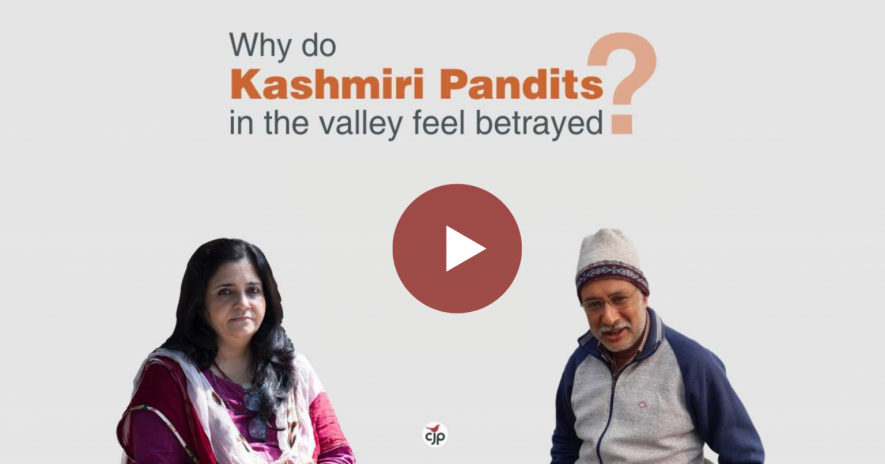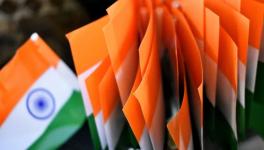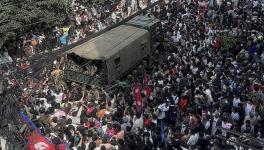Here’s Why Non-migrant Kashmiri Pandits Feel Betrayed

The heart-rending tale of persecution of Kashmiri Pandits has often been told at various socio-cultural and political fora, not only as an example of excesses committed by armed militants in the Kashmir Valley, but also to showcase how the Hindu minority was targeted and driven out of a Muslim majority state.
This has also been politically manipulated in elections all over the country. And while many organisations have both demanded and been granted a special package for the victims of the forced exodus in 1990, few have given voice to demands made non-migrant Kashmiri Pandits.
In 2007-08, the Kashmiri Pandit Sangharsh Samiti (KPSS) travelled across the erstwhile state and conducted a survey of those families that continued to stay in the region. In an exclusive interview to human rights defender and journalist Teesta Setalvad, Sanjay Tickoo tells us their story, many elements of which are bound to reshape the narrative around the struggles of the community.
- At least 600 Kashmiri Pandits were killed in the months before the forced exodus of the community from the valley between 1989-90. They were targeted by armed militants and radical extremists who had issued a deadline for them to leave the state.
- While, the erstwhile state of Jammu and Kashmir always had a Muslim majority, but it was home to over 1,50,000 Kashmiri Pandit people or over 27,000 Kashmiri Pandit families. But at least 20,000 of these families were forced to leave by May 1990. Others continued to leave even after this.
- At present there are at least 808 Kashmiri Pandit families still living in the valley, many in refugee camps. At least 150 of these are low-income families who fall below poverty line (BPL). Most struggle for basic expenses like food and medicine.
- Security that was earlier provided to members of the community has now been withdrawn and Kashmiri Pandit families, especially vocal community leaders are now left to their own devices to protect themselves.
- There are anywhere between 5,000-7,000 Hindu temples across the erstwhile state of Jammu and Kashmir. 1,842 of these are in the Valley. Non-migrant Kashmiri Pandits who have traditionally celebrated festivals like Janmashtami (very differently from Hindus in the rest of India) and even Dussera (since 2008) currently live under a pall of gloom.
- Unemployment is the biggest problem faced by Kashmiri Pandit youth and the KPSS had made repeated representations to the central and erstwhile state governments over the years to provide jobs for them as per their qualifications.
- They moved Jammu & Kashmir High Court in December 2013 forcing the Centre to file a response accepting that non-migrant Kashmiri Pandits required urgent schemes to improve their quality of life. Some provisions related to employment were announced but encountered several bureaucratic hurdles in their proper implementation.
- Memoranda demanding jobs for 600 such youth were presented to various bureaucrats, but no headway was made despite the passage of a considerable amount of time and by the time provisions were made to provide jobs over 80 such people became ineligible as they no longer fit the age criteria.
- A notable exception was former Chief Minister Mehbooba Mufti who Tickoo says prevailed over bureaucrats to implement the provisions in October 2017, but matters came to a standstill when the state was placed under governor’s rule in 2018. Even now, 500 plus Kashmiri Pandit youth are still eligible for jobs under the scheme, but unemployed.
- Tickoo had himself met with three different Prime Ministers; HD Deve Gowda, Manmohan Singh and even Prime Minister Narendra Modi. The meeting with Modi took place when he came to celebrate Diwali in Kashmir after the devastating floods of 2016. He kept reminding them all to include non-migrant Kashmiri Pandits in all schemes being formulated to help the community.
The Rashtriya Swayamsevak Sangh (RSS), says Tickoo, has been busy in the one year since the abrogation of Article 370, feeding and providing other relief to various residents of the Valley including Muslims, even Sikhs. Why, asks Tickoo, are the 808 Kashmiri Pandit families been ignored?
Over the years the KPSS has made multiple representations to different prime ministers, chief ministers, secretaries, governors and other state and now Union Territory (UT) authorities bringing to light various grievances of the community. Just during the period since June 2020, as many as 110 urgent memoranda have been submitted by the KPSS, with little or no response from the administration.
Sanjay Tickoo has announced that he will go on a fast unto death after submitting his final representation to the UT authorities, as he feels there is no other way to get justice for a community that has been reduced being a political pawn or the subject of rhetoric.
The entire interview with Teesta Setalvad may be viewed here:
Courtesy: Citizens for Justice and Peace
Get the latest reports & analysis with people's perspective on Protests, movements & deep analytical videos, discussions of the current affairs in your Telegram app. Subscribe to NewsClick's Telegram channel & get Real-Time updates on stories, as they get published on our website.
























